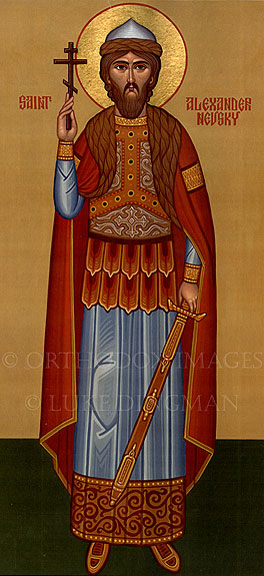 Alexander Yaroslavich is the fourth son of Grand Prince Yaroslav II Vsevolovich of Vladimir. He was born on May 30, 1219 AD in Pereslavl-Zalessky. He is the grandson of Vsevold III. Being the fourth in the dynasty, he had no chance of succeeding his father to the Vladimir crown.
Alexander Yaroslavich is the fourth son of Grand Prince Yaroslav II Vsevolovich of Vladimir. He was born on May 30, 1219 AD in Pereslavl-Zalessky. He is the grandson of Vsevold III. Being the fourth in the dynasty, he had no chance of succeeding his father to the Vladimir crown.
In 1239, he married Alexandra, daughter of the Prince of Polotsk. After his father was poisoned during his visit to the Great Tatar (Mongol) Khan Uziday in 1246, Alexander succeeded him to the Principality of Vladimir.
In 1236, the leaders of Novograd appointed him commander-in-chief of the army to confront the Swedish and German invaders. At that time, Novograd was an important trading center. On July 15, 1240, Alexander and his army surprised the Swedish army in a battle at the confluence of the Izora and Neva rivers. By defeating the Swedes, Alexander put an end to the invasions of the north and increased his political influence over Russia. However, this victory did not strengthen his relations with those belonging to the aristocracy in Russia, which forced him to leave Novograd quickly. As a result of his victory, Alexander, then nineteen years old, was named “Nevsky” after the Neva.
In the spring of 1241, the leaders of Novograd returned and asked Alexander to defend them against the invading German Crusaders. Once again, Alexander and his army were able to deter the invaders, this time in the famous battle on the Peipus Sea near Boskov on April 15, 1242. By defeating the German and Swedish Knights, Alexander stopped their advance towards the east. However, he fought several other battles with the Swedes, including their defeat in 1256, when they tried to prevent the isolation of Novograd from the Baltic Sea. In addition to this victory, Alexander strengthened the defense of the Russian lands in the northwest by concluding a peace treaty with Norway in 1251.
At that time, Tatar (Mongol) forces invaded Russian lands, creeping across the north and south, and destroyed major cities such as “Yaroslavl, Vladimir, Chernigov, and Perbeslavl.” They also turned Kyiv into a small village. Alexander then realized that resistance was of no use, so he chose to compromise and cooperate with the Tatars. When the Tatars came in 1247 to take tribute, Alexander relied on his status to convince the citizens of the region that paying the tax (tribute) was the best solution under these difficult circumstances. When in 1263 some towns refused to pay tribute to Tatar tax collectors, Alexander made his fourth trip to the Tatar headquarters, to plead with the khan to stop the movement of the Tatar army towards Novograd. His success in this mission was the greatest service he provided to his people.
He fell asleep in the Lord on November 14, 1263 on his way back to his homeland. Metropolitan Vladimir Cyril announced the news of his death in the cathedral as soon as it came, saying: “My beloved children, know that the sun of Russia has set.”
In a time full of turmoil and wars, Alexander Nevsky defended his land and his people with great courage. He also succeeded in preserving the integrity of his land. By abdicating to the Mongols, Alexander was able to save Novograd and the lands of Russia from destruction. The Russian Church canonized him in 1547.
Troparia in the fourth tune
Christ has revealed you, O Blessed Alexander, as a new and glorious wonderworker, a God-pleasing man and prince, and a divine jewel of the Russian lands. Today we gather with faith and love to glorify the Lord as we remember you with joy. He has given you the gift of healing. So beg him to strengthen your spiritual children and save all Orthodox Christians.
Qandaq with the eighth tune
We honor you as a radiant, spiritual star that rises in the east and sets in the west, because you have enriched the Russian people with good deeds and wonders, so enlighten us who remember you with faith, O blessed Alexander. Today, as we celebrate your demise, we ask you to pray to the Lord on our behalf, so that He may sustain His weary servants and save all Orthodox Christians.

